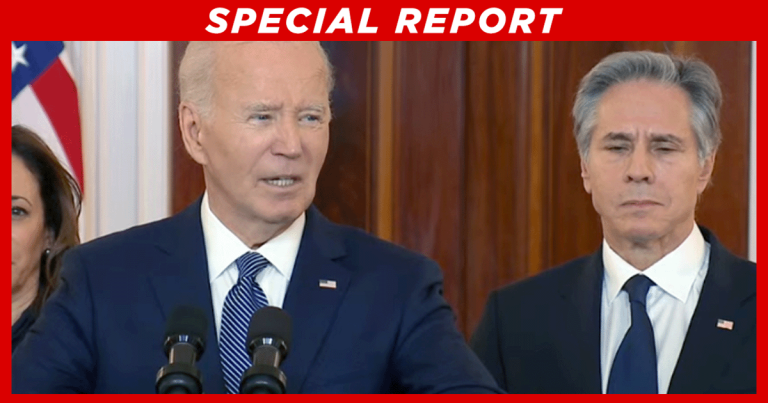
In what was supposed to be a final achievement of his presidency, Joe Biden stood confidently at the White House podium yesterday, flanked by Vice President Harris and Secretary Blinken.
He triumphantly announced a breakthrough ceasefire deal between Israel and Hamas, positioning it as a victory for American diplomacy. The timing seemed perfect – just days before he would leave office, Biden appeared poised to cement his legacy with a historic peace agreement.
But within mere hours, his moment of glory transformed into an embarrassing diplomatic disaster. Israel’s Prime Minister’s office announced that Hamas was attempting to “extort last-minute concessions” on the hostage release agreement, throwing the entire deal into chaos. The terrorist organization’s eleventh-hour demands exposed the fragility of Biden’s diplomatic approach.
Hamas Shows Its True Colors
The bombshell from Netanyahu’s office sent shockwaves through diplomatic circles. According to Israeli officials, Hamas was attempting to fundamentally alter the terms of the agreement at the last possible moment. The terrorist group wasn’t simply making minor adjustments – they were demanding complete control over which Palestinian prisoners Israel would release, a red line that no Israeli government could accept.
The consequences were immediate and severe. Israel’s security cabinet, which had been scheduled to vote on approving the ceasefire, abruptly canceled their meeting. The carefully constructed peace deal, which had taken months of negotiations through Qatari mediators, collapsed before it could even begin.
Within hours of Biden’s triumphant announcement, the Hamas-run Civil Defence agency reported that over 48 people had died in new Israeli strikes overnight, highlighting the human cost of the diplomatic failure.
The timing couldn’t have been worse for Biden. His administration had invested significant diplomatic capital in the agreement, and its collapse exposed fundamental flaws in their approach to Middle East peace negotiations. Critics pointed out that this outcome was predictable, given Hamas’s long history of negotiating in bad faith.
Trump: The Real Deal Maker
President-elect Donald Trump had actually beaten Biden to the punch, announcing the framework of the deal hours before the White House made its formal statement. With his characteristic directness, Trump called the agreement “epic” and tied it directly to his November election victory, demonstrating an understanding of how power dynamics influence international negotiations.
“This could have only happened as a result of our Historic Victory,” Trump posted on social media, explaining how his upcoming presidency had changed the diplomatic landscape.
“It signaled to the entire World that my Administration would seek Peace and negotiate deals to ensure the safety of all Americans.” His emphasis on American strength and decisive leadership stood in stark contrast to Biden’s more traditional diplomatic approach.
Netanyahu Credits Trump’s Leadership
In a telling diplomatic signal, Israel’s leader made it clear who he believed deserved credit for bringing Hamas to the negotiating table. Netanyahu’s office released a detailed statement specifically praising Trump “for his help in promoting the release of the hostages and helping Israel end the suffering of dozens of hostages and their families.” The statement’s timing and content were no accident in the careful world of international diplomacy.
Most notably, the Israeli statement barely mentioned Biden’s role, despite his administration’s claims of leading the negotiations. Instead, it emphasized Trump’s approach of negotiating through strength rather than concessions. This public acknowledgment from Israel’s leadership highlighted a growing recognition that Trump’s more assertive diplomatic style might be more effective in dealing with regional challenges.
Netanyahu’s team pointed to specific aspects of Trump’s approach that they believed had been crucial: his willingness to maintain maximum pressure on Hamas, his clear communication of consequences, and his understanding of the importance of negotiating from a position of strength. These elements, they suggested, had been missing from Biden’s more traditional diplomatic efforts.
White House Diplomatic Disaster
The Biden administration now faces what many experts consider a devastating diplomatic failure at the worst possible moment. Their carefully choreographed peace announcement has completely unraveled, leaving them scrambling to explain what went wrong. Hamas continues to make escalating demands, while Israel has been forced to resume military operations in Gaza.
The timing couldn’t be more problematic for Biden’s legacy. With just days remaining before he leaves office, what was meant to be a crowning achievement has instead become a stark illustration of his administration’s foreign policy weaknesses. The collapse of the deal after his dismissive comments about Trump’s role has made the failure even more embarrassing.
Meanwhile, Trump’s transition team was already working on detailed implementation plans for after the inauguration, demonstrating a level of preparedness that further highlighted the contrasts between the two administrations’ approaches. Foreign policy experts noted that this episode could have lasting implications for how American allies view the effectiveness of different diplomatic styles.
Key Takeaways:
• Biden’s premature victory celebration backfires as Hamas shows true colors.
• Trump’s influence forces the terrorist group to the negotiating table.
• Netanyahu bypasses Biden and credits Trump for the breakthrough.
• White House peace plan collapses before Biden leaves office.
• Over 46,700 Gaza casualties highlight the urgency of a real peace deal.
Sources: Fox News, The Post Millennial, BBC News


